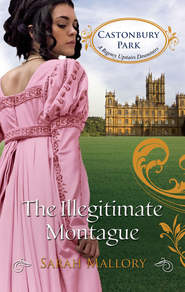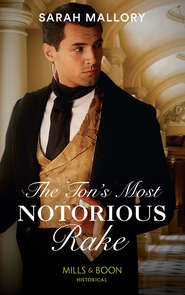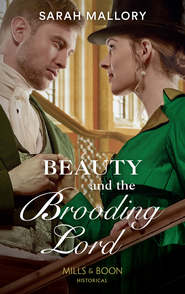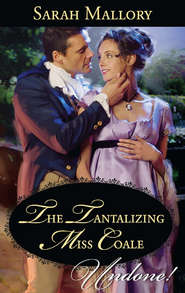По всем вопросам обращайтесь на: info@litportal.ru
(©) 2003-2024.
✖
One Snowy Regency Christmas: A Regency Christmas Carol / Snowbound with the Notorious Rake
Автор
Год написания книги
2019
Настройки чтения
Размер шрифта
Высота строк
Поля
One Snowy Regency Christmas: A Regency Christmas Carol / Snowbound with the Notorious Rake
Christine Merrill
Sarah Mallory
A Regency ChristmasCarol Mill owner Joseph Stratford has earned himself a wicked reputation. Only firebrand Barbara Lampett can see the possibility of his cold heart ever melting. Visited by ghosts of Christmas past, present and future, Joseph is shown the error of his ways. And as the clock strikes midnight on Christmas Eve, the beautiful Barbara awakens Joseph and he enjoys the most delicious of Christmas lessons! Snowbound with the Notorious Rake Trapped by a blizzard with notorious rogue Sir Lawrence Daunton, schoolteacher Rose Westerhill must remain indifferent to his practised charms. But as the temperature outside drops, Rose finds the wicked rake’s sizzling seduction impossible to resist. For one stolen Christmas night she abandons her principles – and her body! – to his expert ministrations…
It may be cold outside, but it’s heating up inside these Regency manors!
It is going to be a very improper Regency Christmas!
One Snowy
REGENCY
Christmas
Two gorgeous, glittering and seasonal Regency romances from favourite authors Christine Merrill and Sarah Mallory
One Snowy Regency Christmas
A Regency Christmas Carol
Christine Merrill
Snowbound with the Notorious Rake
Sarah Mallory
www.millsandboon.co.uk (http://www.millsandboon.co.uk)
A Regency Christmas Carol
Christine Merrill
Dear Reader,
It is always a challenge to write Christmas stories in the Regency. It’s a historical period where the holiday is defined as much by what they didn’t have as what they did. Many of the trappings we consider traditional are actually Victorian. Without carols, cards, trees and Santa, a Regency Christmas looks more like a big house party. And that can end up looking like any other Regency house party, but with the addition of bad weather.
When I began studying the problems in the North during 1811, the task became even harder. The workers were in revolt. At one point there were more British troops there than there were fighting Napoleon. Mill owners were hamstrung by embargoes that kept them from selling their cloth to countries allied with France. That included America, which had been a major source of income. There was an anti-war sentiment that is rarely mentioned in our largely patriotic stories.
The problems I was finding as I researched resonate today as much as they did then. There was a desperate need for compassion and understanding between labour and management.
And that thought led me to a story which was completely out of period, but the best primer anyone can hope for on the reflection, redemption, and charity that can be found at the heart of the Christmas season.
I hope you enjoy it.
Christine Merrill
About the Author
CHRISTINE MERRILL lives on a farm in Wisconsin, USA, with her husband, two sons, and too many pets—all of whom would like her to get off the computer so they can check their e-mail. She has worked by turns in theatre costuming, where she was paid to play with period ballgowns, and as a librarian, where she spent the day surrounded by books. Writing historical romance combines her love of good stories and fancy dress with her ability to stare out of the window and make stuff up.
Look for more great novels from Christine Merrill in Mills & Boon’s Historical romances.
With thanks and apologies to Charles Dickens.
And a question. Why did the spirits do it “all in one night”
when Marley is so specific about needing three?
That’s always confused me.
CHAPTER ONE
December 1811
BARBARA Lampett ran down the lane at the edge of the village of Fiddleton, feeling the crunch of icy mud beneath her feet and the stitch in her side from the cold air in her lungs. Lately it seemed that she was always running after something or other. She wondered if the lack of decorum on her part was the first sign of a life spun out of control.
It was really no fault of her own. Had she the choice, she’d have been in a seat by the parlour fire, staring out at the changing weather and pitying those forced to go about in it. But Father paid little heed to his own discomfort when he was in one of his moods, much less that of others.
And she could hardly expect her mother to go. Mother’s volatile nature would add warmth to the day, but it would do nothing to cool her father’s zeal. Nor was Mother young and strong enough to face the crowd that surrounded him when he spoke, or to extricate him from the hubbub he created.
The new mill lay almost two miles from the centre of the village. It was too short a distance to harness a carriage, but longer than a pleasant walk—especially on such a chill December day as this. Barbara found some consolation that the ground was frozen. She had decided to forgo pattens in favour of speed, but she did not wish to ruin the soft boots she wore by walking through mud.
And much mud there would have been if not for the cold. Ground that had once been green and lush was now worn down to the soil, with the comings and goings of wagons and goods, and the tramp of growing mobs that came to protest at the gates of the new buildings of Mr Joseph Stratford.
A crowd gathered here now. Another of the demonstrations that had been occurring almost daily thanks to her father’s speeches. Mixed amongst the angry weavers were the curious townsfolk. They did not seem to care either way for the plight of the workers, but they enjoyed a good row and came to the gatherings as a form of entertainment.
There was a sudden blast of wind and she wrapped her shawl more tightly about her, unable to fight the feeling of dread that came with the exhilaration. While it pleased her to see the people attracted to her father’s words, the path he was leading them down was a dangerous one and his actions dangerously unwise. With each passing day he seemed to grow more reckless, speaking from the heart and not the head. He could not seem to understand what his comments would do to the local populous.
But she could feel them, caught in the crowd as she was, buffeted by the bodies of angry and fearful men. There was a growing energy in the mob. Some day a chance word or a particularly virulent speech would push them too far. Then they would boil over into real violence.
When the wind blew from the east you could still smell the burned-out wreckage of the old mill, where so many of these men had been employed. That owner had paid dearly for his plans at renovation, seeing his livelihood destroyed and his family threatened until he had given up and quit the area. That had left the protestors with no work at all, and even angrier than they had been before.
It seemed the new master would be cagier. When he’d built his new mill, like the pig in the old story, he had used bricks. It loomed before her, a blight on the horizon. Every element was an insult to the community and proof that the person who had built it lacked sensitivity for his neighbours. It was large and squat and altogether too new. He had not built in the wreckage of Mackay’s Mill, which might have given the people hope of a return to normality. Instead he’d placed it closer to the grand old house where he currently lived. It was not exactly in the front park of the manor, but plainly on the estate, and in a place by the river that the Clairemonts had allowed all in the village to use as common greensward when they’d lived there. It was obvious that Mr Stratford had thought of nothing but his own convenience in choosing this site.
Though he showed no signs of recognising the impropriety of the location, he’d built a fence around a place that had once been the home of picnics and fêtes, trampling the freshness to hard-packed mud. Barbara was convinced it demonstrated on some deep and silent level that the master of it knew he was in the wrong and expected to receive trouble for it. The wrought-iron border surrounding the yard separated it from the people most likely to be angry: the ones whose jobs had been taken by the new mechanised looms.
She pushed her way through the crowd to the place where her father stood at the foot of the stone gatepost, rallying the men to action. Though recent misfortune had addled his wits, it had done nothing to dull the fire in his eye or the clarity in his voice. While his sentiments might be unwise, there was nothing incoherent in the nature of his words.
‘The Orders in Council have already depressed your trade to the point where there is no living to be made by an honest man—no way to sell your cloth to America and other friends of France.’
‘Aye!’
There were shouts and mutters, and the brandishing of torches and axe handles in the crowd. Barbara’s heart gave an uneasy skip at the thought of what might happen should any man think to bring a firearm into the already volatile situation. She was sure that the mill owner towards whom the ire was directed sat in the closed black carriage just behind the gates. From there he could listen to every word. Perhaps he was even noting the name of the speaker and any others preparing to act against him.
But her father cared nothing for it, and went on with his speech. ‘The new looms mean less work for those of you left and more jobs falling to inexperienced girls, while their fathers and brothers sit idle, dreaming of days past when a respectable trade could be plied in this country.’
The mutterings in answer were louder now, and punctuated with shouts and a forward surge of bodies, making the gates rattle in response to the weight of the crowd.
Christine Merrill
Sarah Mallory
A Regency ChristmasCarol Mill owner Joseph Stratford has earned himself a wicked reputation. Only firebrand Barbara Lampett can see the possibility of his cold heart ever melting. Visited by ghosts of Christmas past, present and future, Joseph is shown the error of his ways. And as the clock strikes midnight on Christmas Eve, the beautiful Barbara awakens Joseph and he enjoys the most delicious of Christmas lessons! Snowbound with the Notorious Rake Trapped by a blizzard with notorious rogue Sir Lawrence Daunton, schoolteacher Rose Westerhill must remain indifferent to his practised charms. But as the temperature outside drops, Rose finds the wicked rake’s sizzling seduction impossible to resist. For one stolen Christmas night she abandons her principles – and her body! – to his expert ministrations…
It may be cold outside, but it’s heating up inside these Regency manors!
It is going to be a very improper Regency Christmas!
One Snowy
REGENCY
Christmas
Two gorgeous, glittering and seasonal Regency romances from favourite authors Christine Merrill and Sarah Mallory
One Snowy Regency Christmas
A Regency Christmas Carol
Christine Merrill
Snowbound with the Notorious Rake
Sarah Mallory
www.millsandboon.co.uk (http://www.millsandboon.co.uk)
A Regency Christmas Carol
Christine Merrill
Dear Reader,
It is always a challenge to write Christmas stories in the Regency. It’s a historical period where the holiday is defined as much by what they didn’t have as what they did. Many of the trappings we consider traditional are actually Victorian. Without carols, cards, trees and Santa, a Regency Christmas looks more like a big house party. And that can end up looking like any other Regency house party, but with the addition of bad weather.
When I began studying the problems in the North during 1811, the task became even harder. The workers were in revolt. At one point there were more British troops there than there were fighting Napoleon. Mill owners were hamstrung by embargoes that kept them from selling their cloth to countries allied with France. That included America, which had been a major source of income. There was an anti-war sentiment that is rarely mentioned in our largely patriotic stories.
The problems I was finding as I researched resonate today as much as they did then. There was a desperate need for compassion and understanding between labour and management.
And that thought led me to a story which was completely out of period, but the best primer anyone can hope for on the reflection, redemption, and charity that can be found at the heart of the Christmas season.
I hope you enjoy it.
Christine Merrill
About the Author
CHRISTINE MERRILL lives on a farm in Wisconsin, USA, with her husband, two sons, and too many pets—all of whom would like her to get off the computer so they can check their e-mail. She has worked by turns in theatre costuming, where she was paid to play with period ballgowns, and as a librarian, where she spent the day surrounded by books. Writing historical romance combines her love of good stories and fancy dress with her ability to stare out of the window and make stuff up.
Look for more great novels from Christine Merrill in Mills & Boon’s Historical romances.
With thanks and apologies to Charles Dickens.
And a question. Why did the spirits do it “all in one night”
when Marley is so specific about needing three?
That’s always confused me.
CHAPTER ONE
December 1811
BARBARA Lampett ran down the lane at the edge of the village of Fiddleton, feeling the crunch of icy mud beneath her feet and the stitch in her side from the cold air in her lungs. Lately it seemed that she was always running after something or other. She wondered if the lack of decorum on her part was the first sign of a life spun out of control.
It was really no fault of her own. Had she the choice, she’d have been in a seat by the parlour fire, staring out at the changing weather and pitying those forced to go about in it. But Father paid little heed to his own discomfort when he was in one of his moods, much less that of others.
And she could hardly expect her mother to go. Mother’s volatile nature would add warmth to the day, but it would do nothing to cool her father’s zeal. Nor was Mother young and strong enough to face the crowd that surrounded him when he spoke, or to extricate him from the hubbub he created.
The new mill lay almost two miles from the centre of the village. It was too short a distance to harness a carriage, but longer than a pleasant walk—especially on such a chill December day as this. Barbara found some consolation that the ground was frozen. She had decided to forgo pattens in favour of speed, but she did not wish to ruin the soft boots she wore by walking through mud.
And much mud there would have been if not for the cold. Ground that had once been green and lush was now worn down to the soil, with the comings and goings of wagons and goods, and the tramp of growing mobs that came to protest at the gates of the new buildings of Mr Joseph Stratford.
A crowd gathered here now. Another of the demonstrations that had been occurring almost daily thanks to her father’s speeches. Mixed amongst the angry weavers were the curious townsfolk. They did not seem to care either way for the plight of the workers, but they enjoyed a good row and came to the gatherings as a form of entertainment.
There was a sudden blast of wind and she wrapped her shawl more tightly about her, unable to fight the feeling of dread that came with the exhilaration. While it pleased her to see the people attracted to her father’s words, the path he was leading them down was a dangerous one and his actions dangerously unwise. With each passing day he seemed to grow more reckless, speaking from the heart and not the head. He could not seem to understand what his comments would do to the local populous.
But she could feel them, caught in the crowd as she was, buffeted by the bodies of angry and fearful men. There was a growing energy in the mob. Some day a chance word or a particularly virulent speech would push them too far. Then they would boil over into real violence.
When the wind blew from the east you could still smell the burned-out wreckage of the old mill, where so many of these men had been employed. That owner had paid dearly for his plans at renovation, seeing his livelihood destroyed and his family threatened until he had given up and quit the area. That had left the protestors with no work at all, and even angrier than they had been before.
It seemed the new master would be cagier. When he’d built his new mill, like the pig in the old story, he had used bricks. It loomed before her, a blight on the horizon. Every element was an insult to the community and proof that the person who had built it lacked sensitivity for his neighbours. It was large and squat and altogether too new. He had not built in the wreckage of Mackay’s Mill, which might have given the people hope of a return to normality. Instead he’d placed it closer to the grand old house where he currently lived. It was not exactly in the front park of the manor, but plainly on the estate, and in a place by the river that the Clairemonts had allowed all in the village to use as common greensward when they’d lived there. It was obvious that Mr Stratford had thought of nothing but his own convenience in choosing this site.
Though he showed no signs of recognising the impropriety of the location, he’d built a fence around a place that had once been the home of picnics and fêtes, trampling the freshness to hard-packed mud. Barbara was convinced it demonstrated on some deep and silent level that the master of it knew he was in the wrong and expected to receive trouble for it. The wrought-iron border surrounding the yard separated it from the people most likely to be angry: the ones whose jobs had been taken by the new mechanised looms.
She pushed her way through the crowd to the place where her father stood at the foot of the stone gatepost, rallying the men to action. Though recent misfortune had addled his wits, it had done nothing to dull the fire in his eye or the clarity in his voice. While his sentiments might be unwise, there was nothing incoherent in the nature of his words.
‘The Orders in Council have already depressed your trade to the point where there is no living to be made by an honest man—no way to sell your cloth to America and other friends of France.’
‘Aye!’
There were shouts and mutters, and the brandishing of torches and axe handles in the crowd. Barbara’s heart gave an uneasy skip at the thought of what might happen should any man think to bring a firearm into the already volatile situation. She was sure that the mill owner towards whom the ire was directed sat in the closed black carriage just behind the gates. From there he could listen to every word. Perhaps he was even noting the name of the speaker and any others preparing to act against him.
But her father cared nothing for it, and went on with his speech. ‘The new looms mean less work for those of you left and more jobs falling to inexperienced girls, while their fathers and brothers sit idle, dreaming of days past when a respectable trade could be plied in this country.’
The mutterings in answer were louder now, and punctuated with shouts and a forward surge of bodies, making the gates rattle in response to the weight of the crowd.











